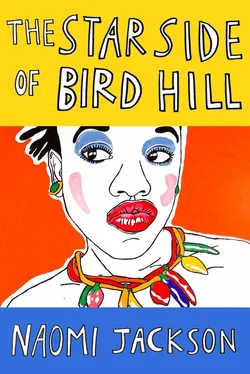Hyacinth could not imagine any safer place to bring a child than a police station, and so Phaedra was in tow when the secretary told Hyacinth that the inspector was a very busy man and asked her what business she had with him. Hyacinth announced herself as Mrs. Braithwaite, midwife, and told the inspector’s secretary that he would know what her business was. In no fewer than the four minutes it took him to finish up a phone call, Inspector Joseph was hugging up Hyacinth as if she were a long-lost aunty, pinching Phaedra’s cheeks in a way that she expected that an uncle might if she had one. After listening to Hyacinth’s story, the inspector put out an all-points bulletin and dispatched his available men, with a special detail to the airport, where he thought Errol might try to leave with Dionne.
By the time the six o’clock news came on, a picture of Dionne from her eighth-grade graduation appeared alongside her name on the CBC, along with instructions to call with any information regarding her whereabouts. As soon as the news went off, neighbors started streaming into Hyacinth’s house, offering their condolences, stories about the time they’d last seen Dionne, offering to pray or cook or both. Phaedra watched her grandmother carefully, and tried to make sense of how this woman, whom she’d taken for granted as part of the backwater her mother always complained about, had been able to make the search happen. She concluded that there was so much about Hyacinth that she still didn’t know.
WHEN ERROL SUGGESTED the sneak out of the stadium before the end of Kiddie Kadooment, Dionne hesitated. She reminded her father of the promise they made to Phaedra and the other kids to stay until the end and take them out after. It didn’t take much convincing, really only Errol glancing down at the tennis bracelet he’d bought Dionne at a duty-free shop in town, to get her to go along. What he’d said—“I ain’t know that one summer in Barbados could turn you into a real grandmother’s child”—shut down Dionne’s protest. She tripped as they squeezed past the other people in their row, her head turned to see if she could spot Phaedra in the band that was being called onto the stage. She and her father took deep breaths once they got to the stairwell, because it was free of the press of people in the stands, but Dionne regretted it once she inhaled the rank odor: the pee smell from people who’d relieved themselves beneath the stadium all Crop Over season was at about the same volume as the music onstage.
They left the stadium and went to the hotel where Errol was staying with Evangeline. Dionne thought to call Ms. Zelma’s house for her grandmother. But years of watching Taneisha and Saranne and other popular girls had taught her not to assert herself until she’d seen what the dominant girl, or boy, or man, in this case, would do. And so, once Errol took off his heavy gold watch and placed it on the nightstand, pulled a bottle from the mini fridge, and turned on the television, all without any mention of Phaedra or Hyacinth, she was sure they were in for the night, and didn’t dare ask to use the telephone. I’m with my father, she thought, trying to convince herself that everything was fine.
Dionne watched Errol pour three glasses of wine, then set one in front of her and another in front of Evangeline. She sipped hers slowly, unused to the bittersweet taste.
“You don’t like it,” Evangeline said.
“No, I like it,” Dionne said too quickly to be convincing.
“It’s OK. Certain things take getting used to,” Evangeline said.
Dionne watched her father pour himself a second glass, all before she’d gotten halfway through her first.
“Dionne, you know, you really starting to get your looks. I deal with a lot of pretty girls in my work, and I can see now that you could go toe-to-toe with any one of them,” Errol said.
“Thank you, Daddy,” Dionne replied. She wanted to ask exactly what kind of work her father was doing now, but she knew that it was better to have Errol offer details about his life than to pry.
“When your mother was your age, she was the prettiest girl.”
Dionne watched the bulge of Errol’s belly move up and down as he talked.
“And when I’m saying the prettiest, I’m not saying the prettiest for Bird Hill, I’m saying the prettiest girl in Barbados. And she was smart, too, almost too smart for her own good.”
“So what happened to her?” Dionne surprised herself by asking.
“Life is a funny thing, you know. Just when you think you know what you’re doing, which way you’re headed, the target moves. At first we thought all we had to do was get out of Barbados, and everything we wanted would fall into place. You couldn’t tell us that everything we dreamed for wouldn’t rain down from the sky the moment we set foot in New York.”
Errol took a big gulp from his wineglass, and then he leaned down to scratch a lesion on his ankle. Dionne watched Evangeline watch her father, noted the way that she hung on his every word and movement, noted the fact that she was now fetching lotion for his dry feet. Dionne wondered if this kind of deference was what a relationship with a man required.
“As soon as we started to get ahold of things there, you came barreling along. And I couldn’t say I was sorry. When you were born, everyone we knew in New York, all my partners from my band, even a couple aunts I didn’t know your mother had, they came to see you. I sat up in the hospital all night holding you. I wouldn’t put you down no matter what. And when they came to take you to the nursery, I bawled bloody murder until one of the nurses brought you back to me. Your first morning, it was my face you opened your eyes on.”
Dionne relaxed into the story she’d heard her father tell so many times; hearing it again stitched back a piece of her heart she didn’t know needed repair.
“So what happened to Mommy?” Dionne asked again.
“You know, Dionne. That is it. That is the million-dollar question. The only one that needs answering. Your mother was hard to know. Twelve years together, eleven of them married, and I couldn’t begin to tell you what was going on in that woman’s head half the time.”
Errol slid open the door that separated the hotel room from its balcony. Dionne heard the sound of the sea rush in, and she followed him outside, where the waves were crashing against the boulders. They stood there, inhaling the brine and listening to the sea’s chatter. There was so much Dionne wanted to say, to ask, but she didn’t want to disturb the moment, the first time she’d been alone with her father in years.
“You want a next drink?” Errol asked, and then turned to go back inside.
“No, please,” Dionne said, feeling the wine hit her head like the waves. She wanted to ask her father why he left them, had been wanting to ask him since he’d showed up at Hyacinth’s house. She stumbled over the metal grating of the glass doors, thrown off kilter by the drinking and her questions and her cowardice. She saw Evangeline, who’d changed into her nightgown and was pinning up her hair when they got back inside, and knew it was a question she didn’t want to ask in front of her.
“You all right?” Errol asked. He pressed a meaty palm against the small of Dionne’s back to steady her.
“I’m fine, Daddy,” Dionne said. And although she wanted to say more, the simple gift of her father’s hands, exactly what she’d missed most of him since he left, stopped her. She was afraid that asking Errol why he’d left might mean he’d never hug her again, and she didn’t want to do anything to lose another parent’s touch. And so she said again, “I’m fine” and then, “Good night,” and crawled into one of the double beds.
Читать дальше












